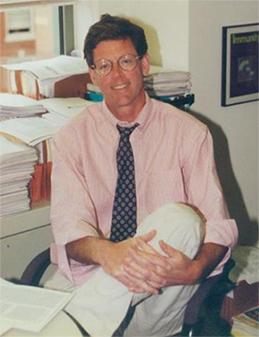Deceased June 8, 2007
View alumni profile (log in required)
Read obituary
In Memory

Tucker grew up in Bay Village, Ohio. At Amherst, Tucker was among a small group of students who performed independent study in biochemistry beginning in his junior year. As a consequence, many people did not know him well since he took few courses during his junior and senior years. He was a superb scientist, even as a teenager, and exhibited a dedication to his work that was remarkable. I first met him when we took biochemistry together, and I was wowed by his talents in the lab. I also got to know him, as many of you did, since he was a “gray coat” in Valentine Hall at dinner.
My friendship with Tucker flourished after Amherst when he and I, along with four other members of our Amherst class, went to the University of Rochester School of Medicine and Dentistry to become physicians. Tucker and I were crazy enough to enter the Medical Scientist Training program, and so we were bound together for six years at Rochester pursuing both M.D. and Ph.D. degrees. At Rochester, Tucker and I came up with the crazy idea to study microtubule structures in a small organism called tetrahymena. We made beautiful electron micrographs of these microtubules and sent our data to a research journal, which promptly rejected it as lacking novelty. While disappointed in the results of our joint project, we had such a great time working together that we became best friends.
Our friendship continued when we both accepted positions at the Brigham and Women’s Hospital in Boston. Tucker became a pathologist and pursued a vascular biology fellowship with Jordan Pober and Mike Gimbrone. Mike said about Tucker, “He loved doing science, and he loved interacting with other scientists in a very personal way. It made him a very good teacher, a very good mentor, and a very wonderful role model. He was the first one in the lab in the wee hours of the morning and just had boundless enthusiasm and energy.” Tucker rose to prominence in two fields: vascular biology and pathology. He was the chair of pathology at Boston Children’s Hospital, the S. Burt Wolbach professor of pathology at Harvard Medical School, and was co-editor of the sixth edition of Robbins Pathologic Basis of Disease, the definitive text for students. He was also the chairman of the Vascular Biology NIH Study Section, on the editorial boards of several major medical journals, and a frequent speaker at international meetings.
While Tucker’s scientific career can simply be described as outstanding, it was as a person that he most affected those around him. He was the best teacher that any of us knew. He had enormous patience, integrity, and knowledge. As a scientist and mentor, Tucker always had time to answer everyone’s questions, provide the critical insights essential to solve the problem and the humanism to carry on.

Tucker was very dedicated to his family. He was blessed late in life with his daughter Caroline who, along with his wife, made him complete. When I heard about his brain tumor, in typical Tucker fashion, he wrote back, “It’s been a very interesting month, but I am doing very well. After a brief medical leave, I’ve returned to work while getting radiation therapy. In response to this challenge, I’ve appointed a new vice chair of pathology and am trying to delegate much of the clinical management issues. You would be proud of my new management style.” As always, Tucker was thinking of others, trying to make a difference, and going forward. His departure leaves a large void in the hearts of all who knew him.
Bradford C. Berk ’75